Learning Multilingual Expressive Speech Representation for Prosody Prediction without Parallel Data
Paper and Code
Jun 29, 2023



We propose a method for speech-to-speech emotionpreserving translation that operates at the level of discrete speech units. Our approach relies on the use of multilingual emotion embedding that can capture affective information in a language-independent manner. We show that this embedding can be used to predict the pitch and duration of speech units in a target language, allowing us to resynthesize the source speech signal with the same emotional content. We evaluate our approach to English and French speech signals and show that it outperforms a baseline method that does not use emotional information, including when the emotion embedding is extracted from a different language. Even if this preliminary study does not address directly the machine translation issue, our results demonstrate the effectiveness of our approach for cross-lingual emotion preservation in the context of speech resynthesis.
 Add to Chrome
Add to Chrome Add to Firefox
Add to Firefox Add to Edge
Add to Edge